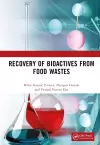
Recovery of Bioactives from Food Wastes
3 authors - Hardback
£135.00
Mihir Kumar Purkait is a Professor in the Department of Chemical Engineering, Dean of Alumni and External Affairs and ex-Head of Centre for the Environment at Indian Institute of Technology Guwahati (IITG). Prior to joining as faculty in IITG (2004), he has received his Ph.D and M.Tech in Chemical Engineering from Indian Institute of Technology, Kharagpur (IITKGP) after completing his B.Tech and B.Sc (Hons) in Chemistry from University of Calcutta. He has received several awards like; Dr. A.V. Rama Rao Foundation’s Best Ph.D Thesis and Research Award in Chemical Engineering from IIChE (2007), BOYSCAST Fellow award (2009-10) from the DST, Young Engineers Award in the field of Chemical Engineering from the Institute of Engineers (India, 2009), Young Scientist Medal award from the Indian National Science Academy (INSA, 2009). Prof. Purkait is a Fellow of Royal Society of Chemistry (FRSC) UK and Fellow of Institute of Engineers (FIE) India. He is the director of 2 incubated company (viz. RD Grow Green India Pvt. Ltd. and Vixudha Bio Products Ltd.). He is also technical advisor of Gammon India Ltd and Indian Oil Corporation, Bethkuchi for their water treatment plant.
His current research activities are focused in four distinct areas viz. i) advanced separation technologies, ii) waste to energy, iii) smart materials for various applications and iv) process intensification. In each of the area, his goal is to synthesis stimuli responsive materials and to develop a more fundamental understanding of the factors governing the performance of the chemical and biochemical processes. He has more than 20 years of experience in academics and research and published more than 250 papers in different reputed journals (citation >12,000, h-index =64, 10 index = 152). He has 10 patents and has completed 35 sponsored and consultancy projects from various funding agencies. Prof. Purkait has guided 20 Ph.D. students. He is the author of 10 books and several book chapters published in reputed internal journals.
Prangan Duarah is a doctoral research fellow at the Centre for the Environment in the Indian Institute of Technology, Guwahati. He worked on a research project at the Indian Institute of Technology, Bombay, before joining IIT Guwahati as a research fellow. He graduated from North Eastern Hill University in Shillong, India, with a B.Tech in Energy Engineering. His current field of study focuses on naturally derived bio-active compounds and green nanomaterial synthesis for various applications. He is a recipient of the prestigious Prime Minister’s Research Fellowship (PMRF), which is given to the country’s most outstanding research scholars as a token of encouragement to pursue their research. He has published several peer-reviewed articles in reputed international journals, along with several book chapters and one book.
Pranjal Pratim Das is currently a research scientist at the Department of Chemical Engineering, Indian Institute of Technology Guwahati, Assam, India. He received his M. Tech (2017) and B. Tech (2014) degree in Food Engineering and Technology from Tezpur (Central) University, Assam, India. His research work is purely dedicated to industrial wastewater treatment via electrochemical and advanced oxidation treatment techniques. His research focus is also related to the application of integrated (electrochemical and oxidation) water treatment processes for the remediation of specific unit operations of steel industry effluents. He is currently working in the treatment of cyanide and phenol contaminated wastewater of Tata Steel Industry, Jamshedpur India. He has published several peer-reviewed articles in reputed international journals, along with patents and book chapters. He is also a potential reviewer of the Journal of Water Process Engineering. Furthermore, he has fabricated and demonstrated many pilot plants for the green energy generations from wastewaters. He has worked extensively in various iron and steel making industries and has also delivered many pilot-scale set-ups to several water treatment facilities across the state of Assam, India for the treatment of toxic contaminated wastewaters.